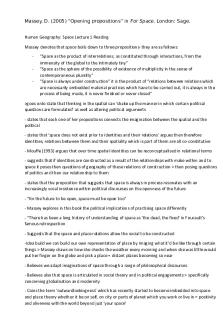Rogers 19 propositions PDF

| Title | Rogers 19 propositions |
|---|---|
| Course | Abnormal Psychology |
| Institution | The University of Warwick |
| Pages | 1 |
| File Size | 67.1 KB |
| File Type | |
| Total Downloads | 12 |
| Total Views | 142 |
Summary
Roger...
Description
Rogers 1. I make sense of myself, others and my world based on my own consistently changing experience. 2. My sense of reality is unique, formed out of what I experience, and out of how I process and understand my experience. 3. My entire way of being and doing arises out of my personal sense of reality. 4. Part of my reality is my sense of self. 5. My sense of self arises from my experiences and perceptions, especially from comparing myself with others, and from the opinions and judgements of others as I perceive them. My sense of self is fluid but includes consistent perceptions. I attach values to these perceptions. 6. I have an innate impulse to care for myself, heal and grow. This includes seeking to keep myself safe and intact, and to realise my inner potential, becoming who I am capable of being. 7. You can adequately understand my behaviour only through understanding how I see myself and others in the world. 8. I behave as I do in order to meet my needs, as I experience and perceive them, and as I experience and perceive reality. 9. I am emotionally present in my behaviour. My feelings are part of how I attempt to get my perceived needs met. What I feel now strongly depends on how important the need is. 10. The values I attach to my experiences and how I value myself are based on my own experience but also include values taken and absorbed from others. I may be unaware of some of my values derived from others. 11. There are a number of ways I can meet my experiences. I can make personal some of the meanings and integrate them into my view of the world. Or I can ignore them because they do not fit with how I see myself or the world. 12. I usually behave in ways that are consistent with how I see myself. So if I believe that I have little value, I will behave as if this is true. 13. Underlying needs and experiences that I deny or distort – or have not managed to make sense of – will tend to leak through in my behaviour. This behaviour may be less consistent with how I see myself. I am not likely to own this behaviour. 14. When I am connected to my authentic being, I am able to be open to my actual experience – its immediacy and totality – and to integrate this into the world. 15. When I disconnect from my own self, I will deny my awareness of my own experience, so it will be very difficult for me to make sense of the world and other people. This causes unease and tension (sometimes known as ‘incongruence’). 16. I may find the experience threatening if it is inconsistent with how I see myself in the world. The more experiences I find threatening, the more rigid my sense of self becomes, and the more tightly I cling to my viewpoint. 17. If I feel accepted and understood, I may be able to look at experiences I had previously denied. When there is this lack of threat, I can begin to make sense of myself. In this way, I am healing myself. (In this statement Rogers was referring to when a client experiences the core conditions in therapy.) 18. When I am able to hold in awareness and integrate all my actual embodied experiencing, I am inevitably more understanding and tolerant of others, and more able to understand the value of others and to accept them as separate beings. 19. When I am able to reshape my view of the world and myself, and include previously denied experiences, I begin to reshape my values. I can let go of introjected values and become a fully functioning person, trusting in myself and my own experience....
Similar Free PDFs

Rogers 19 propositions
- 1 Pages

Ice 6 - 19 propositions
- 3 Pages

CARL Rogers
- 4 Pages

Massey Opening Propositions
- 1 Pages

Rogers - streszcenie
- 4 Pages

Fred Rogers - Grade: 98
- 6 Pages

Rogers-Parse-Watson semplificate
- 4 Pages

TEORI CARL ROGERS tiara
- 7 Pages

Rogers cours 8
- 5 Pages

Logic Notes - Rogers
- 4 Pages
Popular Institutions
- Tinajero National High School - Annex
- Politeknik Caltex Riau
- Yokohama City University
- SGT University
- University of Al-Qadisiyah
- Divine Word College of Vigan
- Techniek College Rotterdam
- Universidade de Santiago
- Universiti Teknologi MARA Cawangan Johor Kampus Pasir Gudang
- Poltekkes Kemenkes Yogyakarta
- Baguio City National High School
- Colegio san marcos
- preparatoria uno
- Centro de Bachillerato Tecnológico Industrial y de Servicios No. 107
- Dalian Maritime University
- Quang Trung Secondary School
- Colegio Tecnológico en Informática
- Corporación Regional de Educación Superior
- Grupo CEDVA
- Dar Al Uloom University
- Centro de Estudios Preuniversitarios de la Universidad Nacional de Ingeniería
- 上智大学
- Aakash International School, Nuna Majara
- San Felipe Neri Catholic School
- Kang Chiao International School - New Taipei City
- Misamis Occidental National High School
- Institución Educativa Escuela Normal Juan Ladrilleros
- Kolehiyo ng Pantukan
- Batanes State College
- Instituto Continental
- Sekolah Menengah Kejuruan Kesehatan Kaltara (Tarakan)
- Colegio de La Inmaculada Concepcion - Cebu





